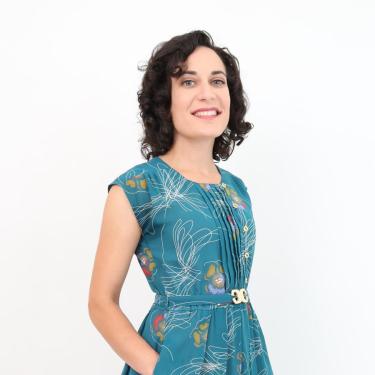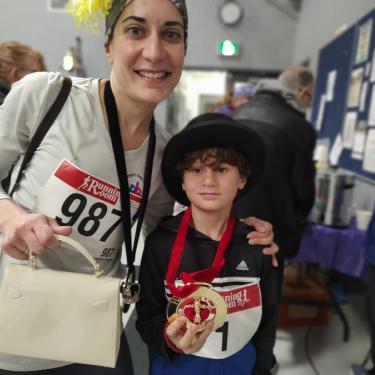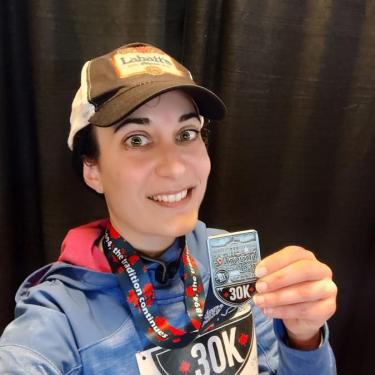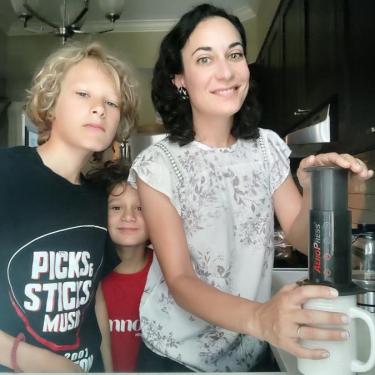
Eleni Opperwall is our Woman of the Week, nominated for her work as a trauma-informed therapist specializing in perinatal mental health. We asked her to tell us how she got from where she started to her practice today:
“Over the years, both trauma and the perinatal period (pregnancy and postpartum) have become special interests of mine, and I have focused my practice primarily in these areas.
“I got my MSW from the University of Michigan in 2007. I had always had an interest in psychology, the healing process, and the inner workings of people. After getting my Master's degree, I started out working in an infant mental health program in the city of Detroit.
“Infant Mental Health is a field that has to do with promoting the attachment bonds between parent and child. The identified client is the infant-parent dyad – the relationship itself. So basically I was doing home-visits in the city to dyads that might be at risk of attachment disruption in some way, and working to be a source of support for the parent. Some of the families had means, but a lot of them were living in very hard circumstances; a couple families were even squatters. I had some very wise and kind mentors along the way who helped me develop skill in working with the parents and creating trust.
“The transition to motherhood (sometimes called “matrescence”) can be such a fertile time of growth, and a time of overwhelming joy and love. But it can also be a very disorienting time, especially for those who have experienced trauma. Self-concept, relationships, social roles, life narrative, boundaries – all of the above can feel like it is tossed into disarray. However, sometimes this temporary disarray reveals more clearly the wounds that are the deepest and in the greatest need of healing. If those wounds can be revealed and cared for, things really do get better, and women find themselves in a much more healthy and sturdy place.
“After my husband Dan and I got married, we moved to Hamilton, Ontario, which is where we live now. I worked in a children's mental health agency for about a decade. I started off working with parents of kids 6 and under. During this time, I also became a Mom, and we welcomed our three beloved kids. Then, for about 6 years, I was working alongside a lactation consultant at a breastfeeding clinic, which may have been the only clinic in the world to have on-site, walk-in mental health support. I was also leading some postpartum support groups for women during that time. Unfortunately, when Covid hit, we lost the funding for the breastfeeding clinic program. But that season was such an enriching time for me to absorb all kinds of wisdom from more wonderful mentors, particularly around trauma and attachment.
“During the pandemic, I made the transition from part-time to full-time private practice. I received training in EMDR, a form of therapy that involves reprocessing traumatic memories. I also started to focus more on clients who had experienced birth trauma, infant loss, and pregnancy loss of all kinds. The past couple of years I've also done more and more work with sexual trauma survivors. Everybody tells you how challenging the work is going to be, so I was prepared for that challenge – but very few people prepared me for how fantastically rewarding it is as well! There is nothing like bearing witness to the healing of another human being.”
Axia!


Our Woman of the Week is Eleni Opperwall, nominated for her work as a trauma-informed therapist specializing in perinatal mental health. You see her here pictured after running the Around the Bay 30k this year, and with a print of an icon of St. Olga, her fellow perinatal worker and patroness of her practice, created by her friend Abe Fillar at Stylite Studios. We asked her what she wanted us to know about attachment and perinatal mental health:
“The rule of thumb is that to hold the baby we hold the Mom. Each parent exists within a network of current and past relationships, and this vast network of relationships impacts their experience of parenting. In my work, I’ve met many parents who have gone through some very traumatic experiences growing up in their own families. Maybe they had been raised in an environment where there was physical abuse, verbal abuse, or sexual abuse, or neglect. Maybe they had been through a difficult experience prior to having a baby or in the birthing process itself. Maybe they were going through a period of depression or anxiety, and that made it really hard for them to respond to their baby. For some Moms, this can create a felt sense of shame, confusion or fear around parenting – “I’m a bad Mom”, or “I don't know what I'm doing.”
“The vast, vast majority of parents want to be the best possible parent for their child. Thankfully, most parents understand the importance of their role, and today we have a good understanding of how crucial it is to be attuned to our kids and to try to be a secure attachment figure for them – someone who is bigger, stronger, wiser and kind. But attachment needs don’t stop when we become adults. Parents need to feel securely attached too. This is part of what I try to offer as a therapist – a relationship where there is a felt sense of secure attachment between my client and myself. But aside from my own relationship with a client, I always try to ask: Who is in your village? We all need to try to be a small part of the village for each other.
“For parents who have experienced trauma or are going through postpartum depression or anxiety, it can feel like society is asking them to pour energy into their child’s cup when their own pitcher is empty. In 2025, parents feel an enormous amount of pressure to figure things out on their own, know what to do, always feel happy about it, and always be responding perfectly every single time. Social media has created a comparison machine, where we are all tempted to see ourselves as the only one who struggles. What’s actually true is the opposite.
“Most parents that I work with are doing an absolutely wonderful job with their kids. But they have a lot of worry about whether it's good enough. There's data that suggests that we spend more hours per day with our kids than any previous generation. And yet rates of parental anxiety about not spending enough time with our kids are higher than any previous generation. It’s such a survival skill to be able to say: I don’t have to be perfect all the time – Love is still possible even when I make a mistake. To me, that's why Grace is essential – for ourselves, each other, everyone.”

As always, we asked our Woman of the Week, Eleni Opperwall, to tell us about her morning routine:
“Our morning routine is a lot less hectic now that the kids are older. Dan and I have three kids, ages 14,12 and 8. So a lot of the morning routine is about helping them get ready for the day.
My caffeination routine is a bit complex. I start off drinking a cup of matcha tea, and then have a coffee later. Depending on what day of the week it is, I try to get out the door for a run before the rest of the family wakes up, and then have a quick shower. If it's a Tuesday or Thursday, I'll do 5K. If it's Saturday, then I do a longer run. Running has become an important part of my life and I usually do a few races a year.
“Our oldest daughter is 14, so she's pretty self-sufficient these days. During the school year, she has to get off to school quite early, so she actually gets on the school bus before the rest of us are up and about. So we’re mostly helping the boys, who are 12 and 8, to get dressed, pack lunches, get ready. We try to have a decently healthy breakfast. Our youngest discovered this year that he knows how to make peanut butter toast, and is now very proud of himself for getting breakfast on the table every morning. He’s a very sweet and helpful little guy. So we have that for breakfast pretty much every morning, because he likes to make it, and then we don't have to remember what day of the week it is.
“Then Dan usually leads the morning prayers in front of the icon stand. After that, if it’s a school day, we walk to the boys’ school, which is two blocks away, while I drink my second round of caffeine – this time a nice big coffee. Now we’re in summer time, so mornings are more leisurely!
“And then I'll either continue on to my office, which is around the block from the boys’ school, if I have an in-person client, or I'll go back home if I have a virtual client. Sometimes I have a Walk and Talk client (which is what it sounds like: you have the session while walking in nature!), so I'll go meet them on the local trail. I love these sessions! I had a dear colleague of mine who trained me in Walk and Talk therapy a couple years ago. Being out in nature, you see that life, healing, order, disorder, reorder: it's all visually unfolding around us, and it's helpful to contextualize yourself within that unfolding of Creation in which everything is constantly made new.”
Thank you, Eleni!


